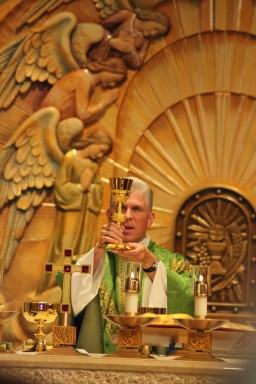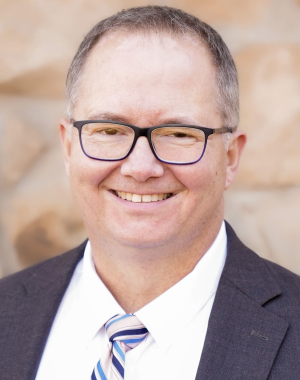 What a sweet consolation it is when we feel close to God in liturgy, with the help perhaps of inspiring music or a challenging homily or a strong connection with members of the assembly. But what happens when such consolations are not our regular experience? How can we encounter God in liturgy even when we’re not feeling “fed”? Such a question is familiar territory for most catechists. As we grow into authentic discipleship, we become more active in the liturgical encounter—becoming responsible agents whose transformative encounter with God depends less and less on the talents of our liturgical ministers and more on our seeking out the presence and action of the Divine Liturgist. Whether we feel particularly close to God or not, liturgy is the pre-eminent place of encounter with God. It is the summit and the font of the entire Christian life.[i] Therefore, in order to enter into the sanctifying worship of liturgy, it is first essential that we attune ourselves to the presence and action of God. Just as a musical instrument must first be tuned to the right pitch before a performance, so we must do the important work of attuning ourselves: bringing ourselves into harmony with God’s unique presence and gift in liturgy. The more we catechists mentor others into genuine preparation for liturgy, the less dependent they will be on liturgical factors (music, homily, etc.) whose ability to move us to active participation in the Paschal Mystery is variable. In liturgy, we encounter the One who emptied himself, took the form of a slave, gave up his life for his friends, and—through the re-presentation of the Paschal Mystery—gives himself away in the here and now of liturgy. In order to encounter God at Mass and in the sacraments, the most important ability we need is alert receptivity to the gift that God makes of himself. This ability can grow stronger as we discover the language of divine self-donation in liturgy and unite ourselves to God through it. “May the Lord be with you.” “Take this, all of you, and eat of it, for this is my Body.” “Lord, I am not worthy that you should enter under my roof, but only say the word and my soul shall be healed.” “I absolve you of your sins.” “Be sealed with the gift of the Holy Spirit.” These sacred words, along with liturgical signs, indicate God’s gift of himself, offered to us in the liturgical encounter. As members of the Mystical Body, we offer all of ourselves back to God in an act of self-giving love. Timothy O’Malley, this issue’s lead writer, expresses this point well: “Our entire selves are joined to Christ’s sacrifice to the Father, as we give ourselves away in prayer in response to the God who first loved us.”[ii] Liturgy becomes then a marvelous exchange – where God pours himself out in love and where we, as members of the Mystical Body of Christ, in union with Christ our Head and Great High Priest, lovingly offer ourselves and every aspect of our lives back to God. This experience of the exchange of life and love with God is truly the summit of the Christian life, for which we all, either subconsciously or consciously, yearn. Good liturgical catechesis prepares us to give all of ourselves in this exchange of love. Entering into sheer divine love, though, has consequences. The National Directory for Catechesis tells us that participants need help to “discern the implications of their participation in the liturgy.”[iii] Pope Francis describes these implications in this way: “The more that you unite yourself to Christ and he becomes the center of your life, the more he leads you out of yourself, leads you from making yourself the center and opens you to others.”[iv] The liturgical encounter, then, has the potential to re-orient a person, to change the landscape of how a person sees and lives. The encounter isn’t merely for the sake of being “fed,” consoled or inspired, but ultimately is meant to change our mode of being, so that we will, through our cooperation with grace, “love one another as I have loved you” (Jn 15:12). Because the sacraments are divine encounters with supernatural effects,[v] mystagogical catechesis, then, becomes a necessary consequence. Such formation should be an apprenticeship into sacramental living. It must be led by those who understand and believe in the divine effects of the sacraments and who can—by their authenticity and teaching—help others cooperate with the initiatives of the Interior Teacher.[vi] Dr. James Pauley is associate professor of Theology and Catechetics at Franciscan University of Steubenville.
What a sweet consolation it is when we feel close to God in liturgy, with the help perhaps of inspiring music or a challenging homily or a strong connection with members of the assembly. But what happens when such consolations are not our regular experience? How can we encounter God in liturgy even when we’re not feeling “fed”? Such a question is familiar territory for most catechists. As we grow into authentic discipleship, we become more active in the liturgical encounter—becoming responsible agents whose transformative encounter with God depends less and less on the talents of our liturgical ministers and more on our seeking out the presence and action of the Divine Liturgist. Whether we feel particularly close to God or not, liturgy is the pre-eminent place of encounter with God. It is the summit and the font of the entire Christian life.[i] Therefore, in order to enter into the sanctifying worship of liturgy, it is first essential that we attune ourselves to the presence and action of God. Just as a musical instrument must first be tuned to the right pitch before a performance, so we must do the important work of attuning ourselves: bringing ourselves into harmony with God’s unique presence and gift in liturgy. The more we catechists mentor others into genuine preparation for liturgy, the less dependent they will be on liturgical factors (music, homily, etc.) whose ability to move us to active participation in the Paschal Mystery is variable. In liturgy, we encounter the One who emptied himself, took the form of a slave, gave up his life for his friends, and—through the re-presentation of the Paschal Mystery—gives himself away in the here and now of liturgy. In order to encounter God at Mass and in the sacraments, the most important ability we need is alert receptivity to the gift that God makes of himself. This ability can grow stronger as we discover the language of divine self-donation in liturgy and unite ourselves to God through it. “May the Lord be with you.” “Take this, all of you, and eat of it, for this is my Body.” “Lord, I am not worthy that you should enter under my roof, but only say the word and my soul shall be healed.” “I absolve you of your sins.” “Be sealed with the gift of the Holy Spirit.” These sacred words, along with liturgical signs, indicate God’s gift of himself, offered to us in the liturgical encounter. As members of the Mystical Body, we offer all of ourselves back to God in an act of self-giving love. Timothy O’Malley, this issue’s lead writer, expresses this point well: “Our entire selves are joined to Christ’s sacrifice to the Father, as we give ourselves away in prayer in response to the God who first loved us.”[ii] Liturgy becomes then a marvelous exchange – where God pours himself out in love and where we, as members of the Mystical Body of Christ, in union with Christ our Head and Great High Priest, lovingly offer ourselves and every aspect of our lives back to God. This experience of the exchange of life and love with God is truly the summit of the Christian life, for which we all, either subconsciously or consciously, yearn. Good liturgical catechesis prepares us to give all of ourselves in this exchange of love. Entering into sheer divine love, though, has consequences. The National Directory for Catechesis tells us that participants need help to “discern the implications of their participation in the liturgy.”[iii] Pope Francis describes these implications in this way: “The more that you unite yourself to Christ and he becomes the center of your life, the more he leads you out of yourself, leads you from making yourself the center and opens you to others.”[iv] The liturgical encounter, then, has the potential to re-orient a person, to change the landscape of how a person sees and lives. The encounter isn’t merely for the sake of being “fed,” consoled or inspired, but ultimately is meant to change our mode of being, so that we will, through our cooperation with grace, “love one another as I have loved you” (Jn 15:12). Because the sacraments are divine encounters with supernatural effects,[v] mystagogical catechesis, then, becomes a necessary consequence. Such formation should be an apprenticeship into sacramental living. It must be led by those who understand and believe in the divine effects of the sacraments and who can—by their authenticity and teaching—help others cooperate with the initiatives of the Interior Teacher.[vi] Dr. James Pauley is associate professor of Theology and Catechetics at Franciscan University of Steubenville.
Notes
This article was originally on page 5 of the printed edition.
This article is from The Catechetical Review (Online Edition ISSN 2379-6324) and may be copied for catechetical purposes only. It may not be reprinted in another published work without the permission of The Catechetical Review by contacting [email protected]
Articles from the Most Recent Issue
Free Mary’s Motherhood: A Healing Balm in Our Modern Times
Free The Eucharist and Our Call to Mission
The Passover and the Eucharist as Redemptive Sacrifices
- ‹ sebelumnya
- 2 dari 6
- selanjutnya ›




